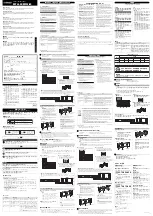
7-18
Section
Data Control Instructions
423
7-18-2
SIGNED BINARY TO BCD SCALING – SCL2(––)
S:
Source word
IR, SR, AR, DM, HR, LR
Ladder Symbols
Operand Data Areas
@SCL2(––)
S
P1
R
R
: Result word
IR, SR, AR, DM, HR, LR
P1:
First parameter word
IR, SR, AR, DM, HR, LR
SCL2(––)
S
P1
R
Limitations
This instruction is available in the
CPM2A/CPM2C only
.
S must be BCD.
P1 through P1+2 must be in the same data area.
DM 6144 to DM 6655 cannot be used for R.
Description
SCL2(––) is used to linearly convert a 4-digit signed hexadecimal value to a
4-digit BCD value. Unlike BCD(24), which converts a 4-digit hexadecimal value
to its 4-digit BCD equivalent (S
hex
→
S
BCD
), SCL2(––) can convert the signed
hexadecimal value according to a specified linear relationship. The conversion
line is defined by the x-intercept and the slope of the line specified in the parame-
ter words P1 to P1+2.
When the execution condition is OFF, SCL2(––) is not executed. When the
execution condition is ON, SCL2(––) converts the 4-digit signed hexadecimal
value in S to the 4-digit BCD value on the line defined by the x-intercept (P1, 0)
and the slope (P1+2
÷
P1+1) and places the results in R. The result is rounded off
to the nearest integer.
If the result is negative, then CY is set to 1. If the result is less than –9999, then
–9999 is written to R. If the result is greater than 9999, then 9999 is written to R.
The following table shows the functions and ranges of the parameter words:
Parameter
Function
Range
P1
x-intercept (signed hex.)
8000 to 7FFF (–32,768 to 32,767)
P1+1
∆
X (signed hex.)
8000 to 7FFF (–32,768 to 32,767)
P1+2
∆
Y (BCD)
0000 to 9999
The following diagram shows the source word, S, converted to R according to
the line defined by the point (P1, 0) and slope
∆
Y/
∆
X.
S
Value after conversion
(BCD)
R
Value before conversion
(Signed hexadecimal)
X-intercept
∆
X
∆
Y
















































